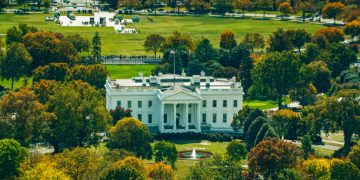The U.S. government has submitted a 49-page brief to the Supreme Court, requesting that the justices affirm the president’s authority to impose tariffs under the International Emergency Economic Powers Act (IEEPA).
The filing, dated Sept. 19, defends the administration’s ability to levy tariffs to address national economic concerns, including the trade deficit and cross-border trafficking. It marks the first step in a case that consolidates three lawsuits brought by seven businesses and 12 states, which argue that tariff powers were applied beyond the limits set by law. The measures in question included tariffs ranging from 10% to 50%, announced on April 2.
Solicitor General D. John Sauer, leading the government’s arguments, said the lower courts erred in their interpretation of IEEPA and emphasized that Congress, not the judiciary, holds primary oversight authority through the statute’s built-in safeguards. These include a one-year default limit on emergency declarations, reporting requirements, and defined exceptions.
The brief rejected the argument that tariffs fall outside IEEPA because the word “tariff” does not appear in the text, noting that statutory authority does not require “specific wording” if the intent is clear. It also contended that challenges to presidential discretion in emergency situations could undermine U.S. economic security and international negotiations.
The administration maintained that broad tariff powers are necessary to respond effectively to national concerns and that limiting them could expose the country to trade retaliation. Opponents, however, argue that granting such authority would significantly expand presidential power, raising constitutional questions about the separation of powers and Congress’s role in setting tax and trade policy.
Legal analysts note that the case could set a precedent on the scope of executive authority in trade matters. Christopher Swift, a partner at Foley & Lardner, said in commentary that a ruling in favor of expansive tariff powers could allow a president to impose duties without prior congressional approval, marking a significant shift in the balance of power between branches of government.
The Supreme Court agreed earlier this month to expedite the case, scheduling oral arguments for Nov. 5. Plaintiffs are expected to submit their response brief by Oct. 20.
#TariffPolicy #TradeLaw #SupremeCourt #SupplyChainNews #NewsUpdate















